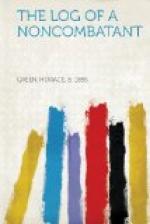It was now eleven o’clock at night and the Berlin express came through Bentheim at 7.45 the next morning. We stayed at a little inn, somewhat resembling the Wayside Inn, at Sudbury, Massachusetts. Here I fell in with a German manufacturer whom I had seen several weeks before as we were bringing the good news from Ghent to Aix. I was surprised at this man’s change of opinion regarding the conflict. On the first occasion he laughed outright at the idea of an extended fight. Now, all through his arguments, he repeated such phrases as, “Well, if Germany doesn’t win,” or, “Suppose the war does last two years,” etc., etc.
In the morning I had a peculiarly disagreeable experience at Lohne, some distance from the German frontier, where we had again to change trains en route to the capital. Experience had by this time taught me, when thrown with people on the road, to show them my papers and make my identity known as soon as possible.
I therefore clung pretty closely to my argumentative German acquaintance of Bentheim and Aix. During the melee of changing cars I was, however, separated from him, and became engaged in conversation (spoken in English) with a Dutch chocolate merchant. The argument must have been interesting, for I did not at first notice a crowd of twenty or thirty travelers and villagers gathering around us: I did, however, notice when they began to push and jostle in a manner obviously intended for insult. When I tried to retreat the exits were locked. The crowd, convinced that I was an English spy, closed more compactly and manhandled me off toward an officer on the street behind the platform. My hat was knocked off, and for a brief moment I recalled the lynching anger which I had seen in the eyes of Belgian mobs, as German spies in Antwerp were being led to the police station.
At the last moment my rescuer came in the shape of the German friend of Bentheim, who broke through the mob and whispered in my ear, “Speak German. Always speak in German, you fool!”
I admitted the soft impeachment.
“Ich bin ein Amerikaner—ein correspondent,” I explained to the row of angry faces; and while my German friend soothed and reassured his testy compatriots, I moved away, glad enough to escape another visit to jail. Those personally conducted jail tours were not so bad, I had found, with a handsome gendarme at your side; but a howling crowd was altogether another matter.
I reached the capital that night. One of my letters says, a few days later:—
“The atmosphere is oppressive to the Anglo-Saxon visitor. His looks, his manner, his accent betray him as one of the English-speaking pest, and the crowd, with its mind so full of English hatred, does not readily distinguish the American. So drop into a word of English in a cafe: your neighbor glowers and draws away. You face it out with a nonchalant air, but gradually the tension grows, especially when, as happened to-day at the prisoners’ camp at Zossen, twenty miles south of Berlin, a great burly Prussian puts a menacing eye on you and says, without introduction: ’It is very dangerous for an Englishman here!’




